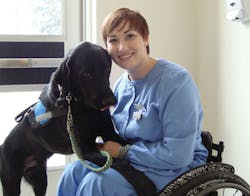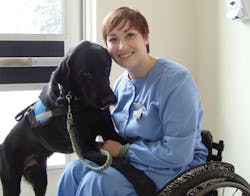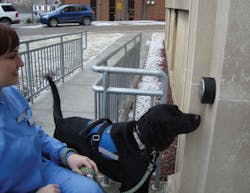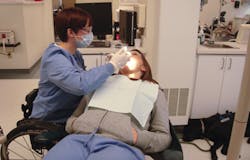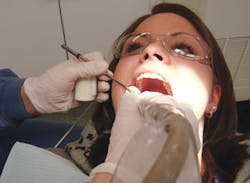A committed command
A paraplegic student prepares for her career with the help of a canine friend
By Cathy Hester Seckman, RDH
Last August, hygiene student Sara Keedy of Wheeling, W.Va., met her new partner in life, Noel. It was a match made in heaven. He accompanies her everywhere, even into the clinic.
"Noel steals the hearts of most patients I see," Sara said. "When I had my first dental phobic in clinic, I could tell he was pretty nervous. While I was going over the medical history, the patient asked if he could meet Noel. I said of course, absolutely, and the patient immediately relaxed after interacting with him."
We could all use a partner like that at times, couldn't we? Sara and Noel form a special partnership, although it's not available to just anyone. Noel is a 75-pound black lab/golden retriever service dog, and his function as Sara's partner is to assure her independence as a wheelchair user.
-------------------------------------------------
Other articles to consider:
-------------------------------------------------
"I became paraplegic in April 2004, when I was 12 years old," Sara relates. "A spinal cord stroke, which came on suddenly and unannounced, left me paralyzed from the waist down. There was no known cause for the stroke."
Despite the tremendous shock, Sara and her family immediately focused on rehabilitation and a return to school. "I can truly say," Sara said, "that the last 10 years have been very rewarding. I was able to have a part-time job, graduate high school, go to college, and even be crowned Ms. Wheelchair USA in 2011."
Her job as a cashier at a movie theater was simple. "I didn't have to make any accommodations. All the counters and computers were low, where I could reach." Her reign as Ms. Wheelchair came about when she read of the contest in a magazine. "I applied online, and upon winning the state competition, was invited to compete for the national title in Cuyahoga Falls, Ohio."
Her platform for the year of her reign was disability awareness on the college campus. By that time, she was a student in the School of Dental Hygiene at West Liberty University in West Virginia. "I became an advocate for change on my campus, and have seen many improvements since. Often, persons with disabilities are labeled by society as someone who ‘can't.' I am someone who will prove the labels wrong."
Sara arrived at WLU after a lifetime of wanting dental hygiene as a career. "I've always wanted to be in the health care field. I want to help others. My love for the dentist has been strong since the first time I went at the age of three. The dental office was never a place of fear for me, but rather, excitement. I always enjoyed getting my teeth cleaned, and even had the same hygienist for about eight years. I really loved having rapport with my hygienist. To her, I wasn't a patient; I was Sara."
Fitting in at school
A dental hygienist she met at a physical therapy session suggested WLU's dental hygiene school, and a visit to the clinic confirmed that hygiene was for her.
"I was immediately sold. WLU has been great with making any accommodations for me as a student clinician. I have a Micromax cordless handpiece and a sonic scaler that is hooked up to my dental unit and operated by a handheld control. I even have an ultrasonic bath at a level I can reach for my instruments. I am truly blessed to have the staff at WLU, and, of course, my classmates help me with anything I need."
The handpiece and scaler were provided by West Virginia's Vocational Rehabilitation program, and belong to Sara. The low-level ultrasonic bath was installed especially for Sara after the staff discovered she couldn't reach the countertop one.
Her classmates, Sara says, have never seen her any differently than other students. "They see me, not the wheelchair. In the beginning, some were more open with me and asked questions. I think others didn't know how to approach me about questions at first. But after spending time with my classmates, we have all grown very close, and any questions they have, they just ask."
She does have a few challenges as a wheelchair user. "There are times when X-rays seem nearly impossible, but I always pull through and don't let it discourage me."
Sara keeps a car on campus, a Mercedes SUV. "I decided on this car because of the weather we get in this area. It's a little tall, but I can still get into it myself. I transfer into it, then disassemble my wheelchair, and load it into the passenger seat."
Learning to command a dog
One thing that makes her time on campus especially easy, of course, is Noel, who has been trained to respond to more than 50 commands.
"Having Noel has helped me tremendously," she said. "He is trained to help me carry out activities of daily living such as carry items for me, pick up items I drop, open and close doors, turn light switches off and on, and take off my socks and shoes."
She acquired Noel through Canine Companions for Independence (CCI). They put her in touch with a woman in Yorkville, Ohio, who uses a CCI dog herself. "She was nice enough to let me spend the day with her and her dog, showing me all he could do for her. Then I traveled to Medford, N.Y., to the CCI northeast region headquarters for a personal interview, and was on a waiting list for two years."
Sara and Noel met at the regional center last year, and spent two weeks getting to know and work with each other.
"Training with Noel was not only fun and exciting, but also exhausting." It takes a whole new vocabulary, she explains, including tone of voice and body language. "When you command him you have to be aware of the tone of your voice -- not angry or too soft. You have to command with commitment, and mean it, but not be loud or use an angry tone. That takes some getting used to. He knows the difference between really being commanded, and being given a command that doesn't have commitment behind it."
Training went from 7:30 a.m. to 4 p.m. every day. Sara loved meeting other people who were getting service dogs, and the staff, she says, was amazing. At graduation, she also loved being able to meet the women who raised Noel. They came from California to Maryland to be at graduation. "I was even given really cute puppy pictures of Noel. I could tell they loved him very much. It was an emotional time for his puppy raisers to see him finally go off, but they knew he was doing what he was raised to do."
Noel, Sara says, loves campus life and fits in perfectly, since his raisers worked on a college campus. He was used to the hustle and bustle. Nearly everyone who passes him stops for a smile, a word, or a quick scratch. In clinic, though, he's a perfect gentleman.
Margaret Six, the program director, said the faculty refers to Noel as "the smartest dental hygiene dog!" Six said Noel has been a welcome addition to the class, and "is so well behaved that we forget that he is even with Sara."
"Noel lays down near my unit," Sara said, "and stays put until he's told otherwise. There has never been an issue with infection control."
He's always available, though, to calm worried patients. "I love seeing Noel soothe an anxious patient. Not only does he help me, he helps others without even being aware of it. Noel is also a big hit with the children. I feel like he brings something special to the clinic. When I am a working hygienist, I know Noel will continue to bring joy to patients in private practice."
At press deadline, Sara was expected to graduate in spring 2014 with a bachelor's degree in dental hygiene. Sara anticipated staying in Wheeling to look for her first position there. "My dream job, however, would be to work as an RDH in Pittsburgh, Pa., at the Veterans Affairs dental clinic. My father is a retired Marine, and has gone to the VA for dental work. I've gone with him a few times, and I enjoy the environment there. His dentist was even nice enough to show me around the clinic when I told him I was a dental hygiene student. I would love to give back to those who serve our country."
Wherever Sara and Noel end up, we can be sure they'll do their best for their patients -- Sara as a caregiver, and Noel as a calming and supportive influence. "I may be described as a paraplegic," Sara admits, "but I've never let it define me or interfere with my dream of becoming a hygienist."
Cathy Hester Seckman, RDH, has worked in pediatric dentistry for 11 years. She is a frequent contributor to dental magazines, works part-time as an indexer, and is the author of two novels and more than a dozen short stories.
Canine Companions for Independence
Founded in 1989, Canine Companions for Independence (CCI) operates its northeast regional training center at the Miller Family campus in Medford, N.Y. Some 656 canine companion teams have graduated from the two-week training program, which is held four times a year.
The waiting list to receive a dog approaches a hundred people, who ask for service dogs, skilled companion dogs, and facility dogs (for hospitals and rehabilitation centers). Some are also used in the criminal justice system, giving comfort to children who are victims of abuse and violent crime. CCI's Wounded Veterans Initiative places dogs with disabled veterans. The average wait to receive a dog is 18 months.
CCI is funded by charitable donations from individuals, corporations, and foundations, and reports that 78 percent of every dollar raised goes directly to program services to match canine companions to people with disabilities. Though it costs more than $45,000 to raise and train each dog, there is no cost to recipients. Ownership of the dogs is retained by CCI, and each dog undergoes yearly re-certification testing at no cost.
CCI breeds Labrador retrievers, golden retrievers, and cross breeds between the two at its national headquarters in Santa Rosa, Calif. The breeds were chosen for their intelligence, strength, and devotion to service, but still, only four out of 10 dogs make it through the entire program.
When puppies are weaned at eight weeks of age, they are flown all over the country to nearly 200 volunteer puppy raisers who take the pups into their homes, raise them, and teach basic commands and socialization skills. At age 18 months, the dogs are sent to regional centers for six months of advanced training and evaluation, then are matched with people with disabilities for a further two weeks of Team Training.
After that final training, the puppy raisers are invited for a graduation ceremony.
One puppy raiser described the feeling: "It's like raising children. When they get old enough, they go off to college. When they're done with college, you don't want them to move back home, do you? You want them to go out, find a job, be happy, and make a difference. That's exactly what these dogs are doing."
Information about CCI is at Canine Companions for Independence, 286 Middle Island Road, Medford, NY 11763, 1-800-572-BARK, www.cci.org.
Past RDH Issues
